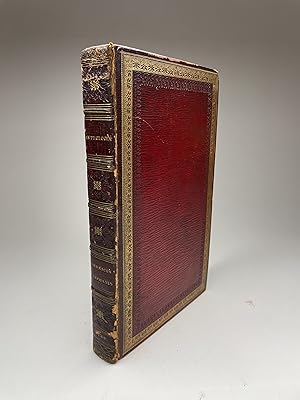Descripción
Anthologia diaphoron epigrammaton palaion, eis hepta biblia dieremenon. Florilegium diversorum epigrammatum veterum, in septem libros divisum ([Geneva]: Henri Estienne for Huldrich Fuggerus, 1566). 4to (255 x 170 cm), (4), 539, (33). Text in Greek, woodcut printer s device to title page. Late 18th or early 19th century red straight-grained morocco, spine divided by raised and gilt-ruled bands into six compartments; compartments elaborately blind-tooled and gilt stamped in centres, gilt-lettered direct in second and fifth compartments, boards with elaborate gilt border with acanthus leaf motif, with inner blind-tooling; edges of boards ruled in gilt, gilt-stamped Greek key design on inner dentelles; all edges gilt. Spine darkened, headcap weakened, hinges slightly worn, minor scuffing to extremities. Henri Estienne's seminal edition of one of the most important poetic anthologies to survive from Classical antiquity. The editio princeps of what is now known at the Planudean Anthology was printed in Florence in 1494 by Lorenzo di Alopa, and edited by Janus Lascaris, which served as the basis for subsequent editions (most notably those of Aldus Manutius in 1504, and Brodaeus edition published by Froben at Basle in 1549). Estienne's text marked a significant improvement on previous editions, and was not superseded until the 18th century. Maximus Planudes (ca. 1260 1305), the greatest scholar of the Palaiologan renaissance, compiled the anthology that now bears his name from a significantly larger anthology dating from the 10th century now known as the Palatine Anthology, after the manuscript's long habitation in the library of the Electorate of the Palatinate in Heidelberg. This later anthology remained undiscovered until 1606, but was not fully published until the late 18th century, by which point it had been split between Heidelberg and Paris. Cardinal Bessarion owned Maximus Planudes' holograph manuscript of the Planudean Anthology, which formed part of his bequest to Venice, but there is no evidence that Lascaris, Aldus, Brodaeus, or Estienne had access to Planudes' holograph, and relied instead on inferior apographs and then the printed vulgate. Provenance: Bookplate of Robert Mackenzie Beverley (1798 1868), Quaker, Justice of the Peace and Deputy Lieutenant of Yorkshire, and polemicist, particularly against Darwin's Evolution of Species. N° de ref. del artículo ABE-1670358012104
Contactar al vendedor
Denunciar este artículo
![]()




